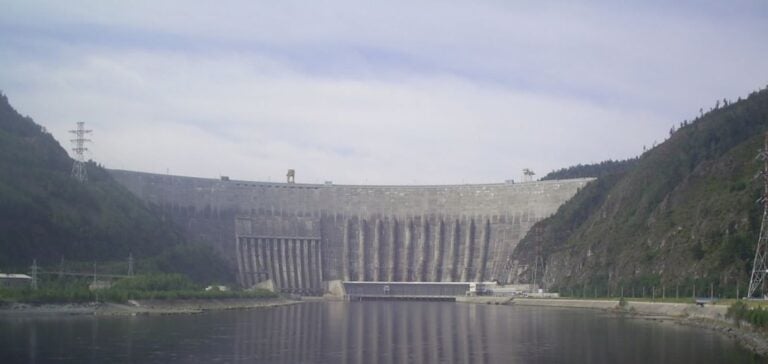The Krapivinskaya hydropower project is a relic of the Soviet era, originally designed to regulate the flow of the Tom River and improve water quality in the coal-rich Kemerovo region. Abandoned in 1989 due to financial constraints and environmental concerns, the plant remains unfinished, a massive concrete and iron structure that still dominates the landscape. Today, the Russian government and companies such as aluminum giant Rusal and its parent group En+ want to relaunch the project. These companies are seeking to diversify their energy sources and reduce their carbon footprint by using hydroelectricity to power their operations. According to experts and activists, the Krapivinskaya hydropower plant could play a key role in the region’s energy strategy, but it also poses significant environmental challenges.
Technology and environmental challenges
Hydroelectric technology is often considered a clean, renewable energy source. However, the construction of the Krapivinskaya hydropower plant presents major environmental challenges. The flooding of surrounding areas required to create the reservoir will release methane, a potent greenhouse gas, from the decomposition of submerged organic matter. Ecologist Evgeny Simonov points out that the flood will also affect two nature reserves, six cemeteries and two livestock burial sites, forcing almost 1,000 people to relocate. Water quality could be compromised by discharges from coal mines and wastewater from the city of Novokuznetsk, exacerbating the pollution problems already present in the region. What’s more, construction of the power plant could disrupt the migration routes of fish such as taimen and grayling, as well as destroying the habitats of numerous aquatic species. Proposed compensation measures, such as fish restocking, are deemed inadequate by experts, who fear that negative environmental impacts will not be adequately mitigated.
Local and political pressure
The debates surrounding the Krapivinskaya project are not limited to environmental issues. Public hearings on the project were marred by incidents of repression and intimidation of opponents. Residents were prevented from attending public meetings, and some activists, such as lawyer Maxim Andrianov, suffered threats and police searches. Andrianov also received threats from unidentified individuals and had a tire punctured on his car, incidents that some attribute to his opposition to the Krapivinskaya project. The governor of the Kemerovo region, Sergei Tsivilyov, strongly supports the project, despite the protests. Known for his intransigence in the face of protests, Tsivilyov sees Krapivinskaya as an opportunity to improve water quality, create strategic freshwater reserves and generate 3,300 jobs. At a public meeting in 2020, he declared:
“I will crush anyone who tries to attack the authorities. With the authorities, we need to sit down at the table and find the optimal solution together.”
Economic outlook and alternatives
Rusal and En+ have announced a 500 billion ruble ($5.4 billion) investment in several large hydroelectric power plants in Siberia, with Krapivinskaya at the top of the list. This investment is part of a wider strategy to reduce carbon emissions and comply with future European Union regulations on imported products. Producing aluminium with a low carbon footprint could give Rusal a competitive edge on international markets, particularly in Europe, where importers will have to pay a carbon price from 2026. However, Western sanctions imposed on Russia complicate the situation. Rusal’s exports are set to fall by a third following US and UK sanctions on Russian aluminum, calling into question the economic viability of such projects. The Chinese market, while promising, will not fully compensate for the loss of Western markets. Some experts fear that, without access to Western markets, Russian companies will no longer have the incentive to invest in low-carbon projects like Krapivinskaya.
Local and global impact
Despite promises of economic and ecological benefits, critics believe that the Krapivinskaya project is likely to cause more harm than good. The environmental compensation measures proposed, such as fish restocking, are deemed inadequate by the experts. The destruction of vast natural areas and the disruption of local ecosystems could have lasting consequences.
Evgeny Simonov remains optimistic about the possibility of transforming the site into a recreational facility, taking advantage of the natural beauty of the area and avoiding the negative impacts of power plant construction. In his view, the project could be abandoned in favor of more sustainable, environmentally-friendly solutions.






















